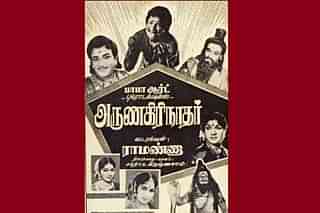Politics
Interfaith Love Between Sikh Man And Muslim Woman Triggered The 'Hate Attack' On Gurudwara Priest In Alwar
Swati Goel Sharma
Jul 24, 2022, 04:07 PM | Updated Jan 20, 2023, 02:11 PM IST
Save & read from anywhere!
Bookmark stories for easy access on any device or the Swarajya app.
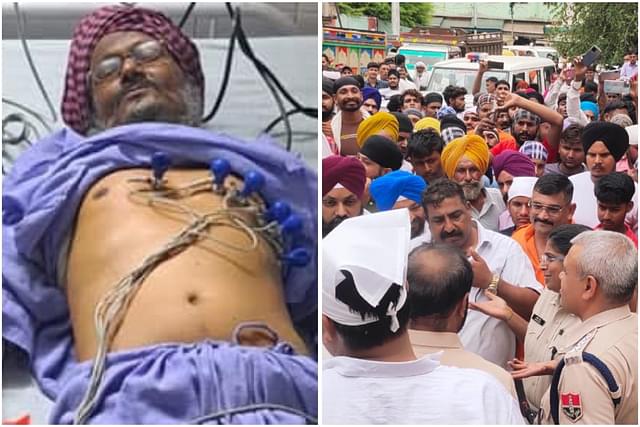
On Thursday night (21 July), a former granthi (priest) of a gurudwara was attacked by five men in what is being seen by the Sikh community as a religious hate crime in the Alwar district of Rajasthan.
The attackers, believed to be Muslims, cut the Sikh man’s hair before letting him go. Victim Gurbaksh Singh is a resident of Milakpur village in Alwar’s Ramgarh tehsil.
In his statement recorded in the first information report (FIR) filed in the case, Singh said he went to the adjoining Alawada village to buy some medicines at around 7.30 pm.
On his return, a man on the road signalled him to stop, saying that a Sikh man was lying injured. As Singh stopped his motorcycle, the man, joined by four others, held him by his neck. Two of them were carrying knives. They threw chilli powder in his eyes and covered his eyes with a cloth.
They began discussing among themselves a plan to behead Singh. When Singh pleaded to know his offence, the men said that his kind were eloping with Muslim women. Singh said that the men were mistaken, that he was a not a native of Alwar but of Sikri, and he was a pujari at a gurudwara.
Hearing this, the men called up one “Jumma,” asking what to do with Singh. The man on the other side told them not to kill Singh, but to leave him after cutting his hair. Singh pleaded with the men not to cut his hair and instead cut his throat. However, the men did as instructed.
By the time Singh removed the cloth strip on his eyes, the men had left.
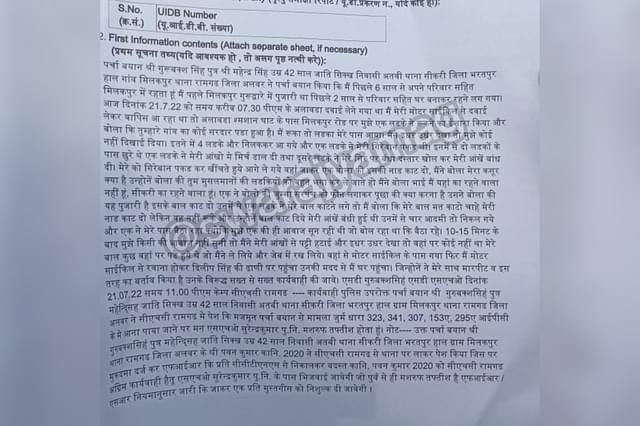
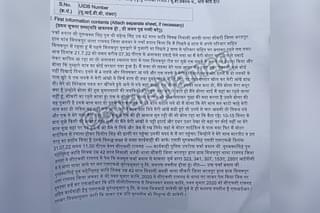
(Watch Singh’s statement given to the media here.)
The FIR (number 417/2022) was filed at Ramgarh police station on 21 July. Based on the complaint, the police booked “Jumma sarpanch” and four unidentified men under the Indian Penal Code (IPC) sections 323 (causing hurt), 341 (wrongful restraint), 307 (attempt to murder), 153A (promoting enmity), and 295A (deliberately hurting religious sentiments).
In Sikhism, “kesh,” or uncut hair, form one of the "Five Ks," which are physical symbols worn by Sikhs who are initiated into the Khalsa. The other Ks are Kara (a steel bracelet), Kanga (a wooden comb), Kaccha (cotton underwear), and Kirpan (steel sword).
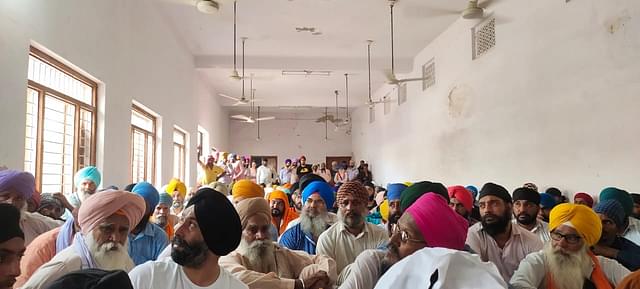

A resident of Alawada village, without wanting to be named, told Swarajya over the phone that in April a man from the Sikh community had eloped with a Muslim woman for marriage. Both are adults and the affair was consensual.
“The Meos saw it as an affront to their community. They staged protests. Eventually, Jumma intervened and made the police recover the woman. From the police station, Jumma brought the woman back home despite her wish to go with the Sikh man,” the source said.
“Since then, that Sikh family has been living under threat. They have not been going out much,” he added.
The source said that Jumma Khan is the Sarpanch of Alawada. He said Muslims comprise “1500 votes” in Alawada, compared to the “400 votes” of Sikhs.
In Alwar, Muslims are overwhelmingly converts from the Meo jaati. Sikhs are largely Rai Sikhs that come under the backward castes.
News agency PTI has quoted Alwar Superintendent of Police Tejaswani Gautam as saying that it appears that Singh was targeted because of old enmity between Sikhs and Meo Muslims in Alawada village over alleged love affairs.
On Friday (22 July), the local Sikh community held a panchayat to make a consensus on demands and staged a protest outside the police station asking for swift arrests in the case. The protest was joined by Hindu residents.
About Alwar
The district of Alwar, which borders the state of Haryana, comprises a large portion of what is called the Mewat belt, known for its high rate of crime. Mewat gets its name from the native Meo jaati population. Almost the whole of the jaati group has converted to Islam over several centuries.
A part of the belt is in Haryana’s Nuh district, where criminals from the Meo community recently mowed down a high-ranking police officer of Haryana police.
The belt is notorious for cow smuggling and slaughter activities. In 2019, the then Haryana director general of police Manoj Yadava told a bench of the Punjab and Haryana High Court in an affidavit that the police personnel in Mewat were working in quite a hostile atmosphere, facing danger to their life and safety.
The court in turn observed that the offences of cow smuggling and slaughter in Mewat were “being committed by hardcore smugglers, fully trained, and that too in a well-planned manner on large scale in an organised way."
In 2018, a man named Rakbar Khan, who was from the Meo community and a charge-sheeted cow smuggler, died after being caught by residents of Lalawandi in Alwar around midnight while he was dragging two cows through a field. Villagers handed him to the police, but Khan died in police custody the same night.
The police booked several villagers for Khan’s "murder," accusing them of beating him and causing internal injuries. A large section of the media and activists used the case to raise the bogey of “lynchistan” and labelled Alwar a "Hindutva laboratory." (Read Swarajya’s rebuttal to the labelling here.)
Save & read from anywhere!
Bookmark stories for easy access on any device or the Swarajya app.
Swati Goel Sharma is a senior editor at Swarajya. She tweets at @swati_gs.
Introducing ElectionsHQ + 50 Ground Reports Project
The 2024 elections might seem easy to guess, but there are some important questions that shouldn't be missed.
Do freebies still sway voters? Do people prioritise infrastructure when voting? How will Punjab vote?
The answers to these questions provide great insights into where we, as a country, are headed in the years to come.
Swarajya is starting a project with an aim to do 50 solid ground stories and a smart commentary service on WhatsApp, a one-of-a-kind. We'd love your support during this election season.
Click below to contribute.





